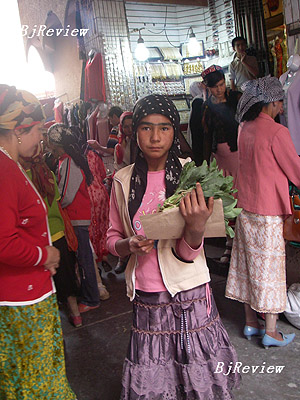
Last month cabin fever overwhelmed me. I desperately needed a break: from my polite but wily students, from my unsatisfactory yet demanding lover, and from my overpopulated and mundane Chinese city. But going abroad took too much time, money and planning. Suddenly, in a flash of insight I recalled Kashi, the Chinese Silk Road city 400 km from the Afghan border. "It's a fabulous forgotten world," a chubby Italian photojournalist had gushed to me over noodles. "They're Muslims who irrigate their desert fields with the karez, an ancient underground irrigation system. And the food: melons, almonds, figs: you'd think you were in Iran. The aroma of roast lamb and flat bread wafts everywhere." He kissed his fingers appreciatively. "The Internet has arrived but the city still lives in a Biblical era. Mosques call people to prayer. Plus Kashi has the largest Sunday market in China."
"Is it safe for a lone woman traveler?" I queried.
"Safer than going to Rome, my dear," he replied, winking lecherously.
No further persuasion was necessary. I booked my flight. A few hours later strolling through the Kashi Airport, a very friendly and very wiry Uygur man grinned at me, exposing two flashy gold teeth. "Bus to town?" he asked cheerfully. I nodded.
He dropped me off at the Seman Hotel, once the Russian consulate. A pretty young maid in national dress led me to my room. "Cheap but suitable for a concubine," I thought smugly, noting the ornate plastered walls, soft bed and lace curtains. "No wonder the Russians hated to leave this joint." And in fact, throughout history many nations, particularly China, have fought for control of Kashi and its environs. Although this remote city is closer to either Moscow or New Delhi than to Beijing, its location is strategic, for the city sits at the foot of the enormous Pamir Mountains. From Kashi traders and warriors once staggered across them and then through the treacherous Taklimakan Shamo Desert, following the Silk Road highway from China into Central Asia, India and Persia.
This desert oasis town connected Rome and China over 2,000 years ago. I, too, made a desert crossing in a bus to Hotan, a city famous for rugs and jade. But the eight-hour journey dehydrated and exhausted me. "How did they feel on camels and ponies?" I grimly wondered. In their bazaar a grizzled rug dealer sternly advised, "Go back to Kashi. We send our best stuff there." Wearily I boarded the musty old bus again, my skin itching from searing heat and dry air.
For centuries the Chinese controlled Kashi. Then, between the 10th and 12th centuries the Turks arrived. Thus, Islam, rather than Buddhism, became the dominant religion. These nomadic Turkish tribes understood the city's strategic location for trade. Although the Mongols sacked Kashi in the 1300s, Islam and the Turkish people remained.
Later, in the 1800s this mesmerizing Muslim city became important again. Russians, Chinese and the British struggled for control of Central Asia and they all wanted Kashi. Again the Chinese won out, allowing tourists like me to peacefully sleep in defunct Russian consulates.
Back in the hotel, I met up with a young bilingual Uygur guide named Omar. Together we biked around the city, exploring streets and alleyways. Kashi bustled in a very un-Chinese fashion. Drums pounded, advertising shops. Vendors hawked blood-red pomegranate juice and glistening melon slices. Sultry women swayed by in sequined dresses and colorful headscarves while large-eyed bearded men in pale caftans watched them intently. Few spoke Chinese. Over 90 percent of the city's 300,000 residents are Turkic--Uygurs, Tajiks or Kazakhs.
I marveled as Turkish artisans worked on the street making copper pots, wooden spoons and steel knives, but soon I tugged at Omar's ragged T-shirt, and confessed, "Rugs, I want to see real carpet." Patiently he led me to his friends' shops. Finally the legendary Hotan carpets were at my fingertips, as well as kilims carried in by dusty dark-eyed traders from Iran, Afghanistan and Turkmenistan. We sat on piles of precious carpet, haggling in slow motion, like poker players. Bargaining here is not only acceptable, but expected. Finally, after hours negotiating and drinking tea, I lugged out a beautiful camel's hair rug from Afghanistan.
"You did well for a foreign lady," commented Omar. "And you certainly do not look your age." He glanced at my sweaty bosom. Pleased and somewhat flattered by his attention I wondered, "Is he seeking a tip or a fling?"
"Hah," I smirked internally. "If he were 10 years older he'd get both, for these swarthy Uygur men are sexy, indeed."
But outwardly I demurely replied, "Certainly, a return trip is necessary to look around for more treasures in your extraordinary city."
The author is an American teaching in Inner Mongolia |
